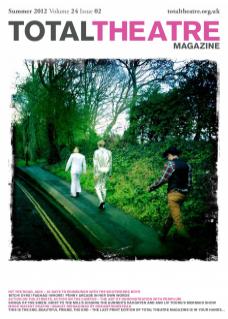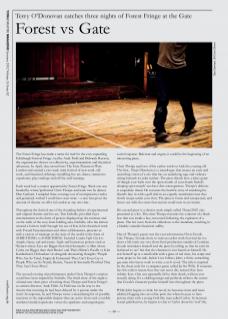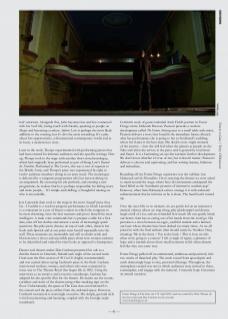The Forest Fringe has made a name for itself in the ever-expanding Edinburgh Festival Fringe. Led by Andy Field and Deborah Pearson, the organisation thrives on collectivity, experimentation and theatrical adventure. In April, they moved into The Gate Theatre in West London and created a two-week mini festival of new work, old work, and theatrical offerings straddling live art, dance, immersive experience, play readings and off-the-cuff musings.
Each week had a curator appointed by Forest Fringe. Week one was headed by writer/performer Chris Thorpe and week two by dancer Dan Canham. I sampled three evenings out of an impressive twelve and genuinely wished I could have seen more – a rare feat given the amount of theatre on offer in London at any one time.
Throughout the festival one of the founding fathers of experimental and original theatre and live art, Tim Etchells, provided foyer entertainment in the form of posters displayed up the staircase and on the walls of the cosy Gate holding area. Etchells, who has almost created a form in itself through his use of lists in his theatrical work with Forced Entertainment and other collaborators, presents us with a variety of musings on the state of the world in the form of SOMETHING vs SOMETHING. Entitled London Fight City it is simple, funny, sad and astute. Light and humorous posters such as ‘Women whose Eyes are Bigger than their Stomachs vs Men whose Cocks are Bigger than their Brains’ and ‘Paris Hilton’s Poodle vs Kim Kardashian’s Chihuahua’ sit alongside devastating thoughts: ‘People Who Are So Tired, Empty & Exhausted They Can’t Even Cry vs People Who are So Numb, Beaten, Vacant & Internally Petrified That They Can’t Even Move’.
The second evening of performances under Chris Thorpe’s curation could have been inspired by Etchells. The third show of the night is a brand new short piece of writing from Thorpe and Forest Fringe’s co-artistic director, Andy Field. As Field was on his way to the theatre that morning he had been delayed by ‘a person under the train’. In response, he and Thorpe wrote a meandering list of possible reactions to the impossible despair that can arrive from such a terrible accident/suicide/experience versus the apathetic and unapologetic social response. Relevant and urgent, it could be the beginning of an interesting piece.
Chris Thorpe read two of his earlier works to kick the evening off. The first, Thorpe/Manchester, is a monologue that creates an eerie and unsettling vision of a city that has an underlying rage and violence sitting beneath its calm surface. The piece details how a jokey game of ‘dangle your balls over the open mouth of your drunk friend’s sleeping open mouth’ can have dire consequences. Thorpe’s delivery is exquisitely timed. He recounts the horrific story of smashing his friend’s face in with a golf club in an expertly nonchalant tone that slowly creeps under your skin. The piece is funny and unexpected, and leaves one with the sense that anyone could turn in an instant.
His second piece is a shorter work simply called Thorpe/2007, also presented as a list. This time Thorpe recounts the contents of a black box that was inside a boy, recovered following the explosion of a plane. The list veers from the ridiculous to the mundane, resulting in a bleakly comedic theatrical oddity.
One of Thorpe’s guests was the ever-adventurous Chris Goode. Like Thorpe, Goode chose to read an earlier work that had far too short a life (only one very short-lived production outside of London). Goode introduces himself and the piece by telling us that he can’t be bothered to ‘act’ but that the character is not based on himself. He sets himself up at a small table with a glass of red wine, his script and some props to his side. Infinite Lives follows John, a thirty-something gay man who leaves work to write a sci-fi novel. The title is inspired by the cheat code for a computer game called Jet Set Willy. If someone has this code it means that they can never die; instead they have infinite lives. One can repeatedly fall to their death, without ever actually dying. It’s a chilling image and perfectly reflects the corner that Goode’s character pushes himself into throughout the piece.
While John begins to write his novel, he becomes more and more addicted logging into an online porn site where he pays to have private chats with a young God-like man called Carlos. In between sexual gratification, he begins to chat to Carlos about his ‘real’ life, ‘real’ emotions. Alongside this, John becomes less and less connected with his ‘real’ life, losing touch with friends, speaking to people on Skype and becoming a recluse. Infinite Lives is perhaps the most bleak addition to the evening, but it’s also the most rewarding. It’s a play about lost opportunities, a disconnected contemporary world, and at its heart, a modern love story.
Later in the week, Thorpe experimented with performing pieces that had been created for intimate audiences and site-specific settings. First up, Thorpe took to the stage with another short story/monologue, which had originally been performed as part of Slung Low’s Beyond the Frontline. Performed at The Lowry, this was a sort of requiem to the British Army, and Thorpe’s piece was experienced by eight to twelve audience members sitting in an army truck. The monologue is delivered by a computer programmer who has been working on an assignment. By executing his job perfectly, and creating a new programme, he realises that he is perhaps responsible for killing more and more people… It’s simple and chilling; a thoughtful musing on who is accountable.
Jess Latowicki then took to the stage in the most ‘staged’ piece thus far. A Faultline is a work-in-progress performance in which Latowicki is a contestant in a sort of beauty contest in which she competes to be most charming, have the best manners and prove herself the most intelligent. A male voice commands her to prepare a table for a first date, take off her clothes and answer a series of increasingly quick questions. She piles party dresses on top of each other, dissects her body with lipstick and at one point runs herself repeatedly into the wall. These moments are memorable and will no doubt settle and blossom into a clever and accessible piece about how women continue to be objectified and valued for their looks as opposed to brainpower.
Dancer and theatre-maker Dan Canham presented his ode to a derelict theatre in Limerick, Ireland each night of the second week. I had seen the film version of 30 Cecil St (highly recommended) and was excited about seeing Canham’s piece in the flesh. Canham interviewed workers, owners, and others who were connected in some way to The Theatre Royal that began life in 1852. Using the interviews as an emotive and evocative soundscape, Canham has adapted his site-specific film for the theatre. He marks out the rooms, corridors and stairs of the theatre using white masking tape on the floor. Unfortunately, the space at The Gate does not lend itself to the conceit and the piece suffers from the awkward space. However, Canham’s movement is stunningly evocative. His simple, gestural style is both mesmerising and haunting, coupled with the lovingly made soundtrack.
Canham’s week of guests included Andy Field’s partner in Forest Fringe crime: Deborah Pearson. Pearson presents a work-in-development called The Future. Sitting next to a small table with notes, Pearson delivers a story that foretells the immediate future: directly after her performance she is going to her ex-boyfriend’s wedding, where her fiancé is the best man. She details every single moment of the journey – how she will feel when she glances at people on the Tube and when she arrives at the party and is greeted by boyfriend and fiancé. It is a fascinating set-up that warrants further development. We don’t know whether it’s true or not, but it doesn’t matter. Pearson’s delivery is electric and captivating, and her writing intense, hilarious and immediate.
Rounding off my Forest Fringe experience was the sublime Sam Halmarack and the Miserablites. On re-entering the theatre we were asked to stand around the stage, where fairy-lit instruments anticipated the band billed as the ‘bombastic pioneers of interactive stadium pop’. However, when Sam Halmarack arrives onstage it is with awkward embarrassment that he informs us he is alone. The band hasn’t turned up.
Over the next fifty or so minutes, we are gently led on an interactive musical odyssey where we sing along, play glockenspiel and drums, laugh a hell of a lot, and are reminded how much life can quietly break our hearts. Sam has us eating out of his hands from the word go. His persona is a cross between an eager, youthful student and a burnedout loser whose dreams have been dashed too many times. As we all joined in with the final anthem (that should surely be Number One), chanting ‘Me in the front / You in the back / This is how we ride when we’re going to a concert’ I felt a tingle of regret, a glimmer of hope and a warmth about those small moments in life when dreams feel like they can come true.
Forest Fringe pulled off an understated, ambitious and positively rich two weeks of theatrical play. The work veered from apocalyptic and earth shatteringly huge to tiny, personal offerings. Throughout, the atmosphere created was one in which audiences were invited to share, contemplate, and engage with the material. I sincerely hope it becomes an annual occasion.
Forest Fringe at The Gate ran 9-21 April 2012, and was curated by Chris Thorpe (in the first week) and Dan Canham (in the second). www.forestfringe.co.uk


